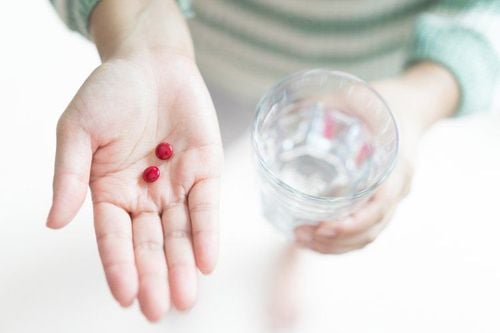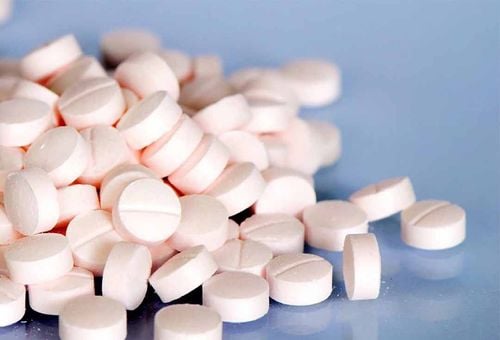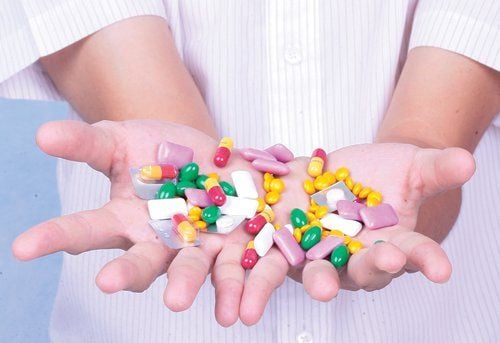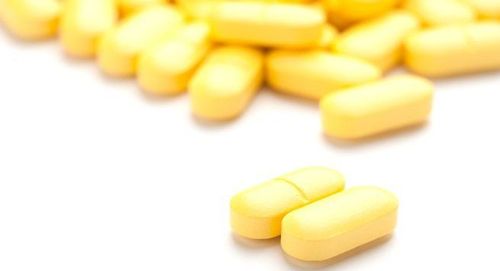This is an automatically translated article.
Iron is necessary for the process of blood formation, growth, brain development and nervous system of children. Therefore, giving children iron at any time of the day for best absorption is a matter of concern for parents.1. What time of day should children take iron?
Iron content drops to a low level after a long sleep, so early morning is the best time to supplement iron in time to provide for the day's activities. Therefore, to the question "when is the best time for children to take iron", the answer is that it should be supplemented at least 30 minutes before breakfast. For children who are prone to abdominal pain and nausea when taking iron before meals, it should be given during or after meals, starting with a low dose.
2. How to take iron for best absorption?
In addition to "when to give iron to the baby", "how to take iron for best absorption" is also an issue that parents need to pay attention to.
To best absorb iron for children, parents should:
Before or after taking iron, you should eat more fruits rich in vitamin C, because this vitamin has the effect of increasing iron absorption into the body. In addition, B vitamins such as vitamin B6 also have the same effect. On the contrary, you should avoid drinking tea and coffee with iron because the tannins in tea and caffeine in coffee interfere with iron absorption. Limit phosphorus-rich foods when taking iron because it can cause iron precipitation, reducing iron absorption. Iron and calcium should not be taken together as they can interfere with iron absorption. When you need to take both of these minerals, especially pregnant women, they need to take them at least 2 hours apart. In addition, when taking iron, it should not be taken with antibiotics of the tetracycline group, quinolone group and thyroid hormone. If you are using this group of drugs, you need to treat the disease and stop taking it before taking iron. Do not take iron together with medicines to treat stomach diseases such as gastric acid neutralizers, proton pump inhibitors, H2 blockers. Syrup and other liquid iron drugs can cause tooth discoloration when used for a long time, so after drinking, children should rinse their mouth and brush their teeth. Black stool color can also occur after taking iron, but it is not harmful to health. Parents should keep iron out of reach of children because mistakenly drinking can cause acute poisoning with symptoms of abdominal pain, diarrhea, vomiting, ... or later, fingernails, palms turning green, Pale; convulsions; fast breathing.

“Nên cho bé uống sắt vào lúc nào” là vấn đề mà cha mẹ cần quan tâm
3. What kind of food contains a lot of iron?
Iron is abundant in both animal and plant foods, depending on the child's dietary preferences, choose the right type for the child.
Iron of animal origin: Red meat (pork, beef); seafood (tuna, shrimp, crab, squid, scallops); poultry (chicken, duck); eggs and animal organs. Iron from plants: Dark green vegetables (water spinach, broccoli, cruciferous vegetables, spinach); legumes (soybeans, chickpeas); whole grains, dried fruit. In particular, the body absorbs animal iron better than plant iron. Therefore, with a traditional vegetarian family, it is advisable to combine fruits rich in vitamin C (citrus, papaya, strawberry) to increase iron absorption.
4. Subjects needing iron supplements
Iron has an important role in creating hemoglobin, myoglobin in the blood, so iron deficiency can cause anemia, affecting the transport of oxygen to muscle tissues, making the body tired, poor concentration, decreased concentration. memory.Iron is necessary for pregnant and lactating women, premature babies, pubertal women, people with iron absorption disorders, acute blood loss, digestive disorders. During puberty, iron deficiency can affect the nervous system, causing memory loss, weakness, difficulty concentrating and studying.
During pregnancy, iron deficiency easily causes premature birth, miscarriage and postpartum hemorrhage, even fetal malnutrition increases the risk of birth defects. In young children, iron deficiency can cause fussiness, loss of appetite, little sleep, memory loss, speech delay, walking delay, and decreased muscle tone.
Iron requirements by age are described as follows:
| Độ tuổi | Hàm lượng sắt |
|---|---|
| 3 - 6 tháng | 6.6mg/ngày |
| 6 - 12 tháng | 8.8mg/ngày |
| 01 - 10 tuổi | 10mg/ngày |
| Nam giới tuổi dậy thì | 12mg/ngày |
| Nam giới trưởng thành | 10mg/ngày |
| Nữ giới tuổi dậy thì | 20mg/ngày |
| Nữ giới tuổi trưởng thành | 18mg/ngày |
| Phụ nữ mang thai | 60mg/ngày |
| Phụ nữ mãn kinh | 10mg/ngày |

“Trẻ uống sắt vào lúc nào tốt nhất” thì câu trả lời là nên bổ sung trước ăn sáng tối thiểu 30 phút
Full-term infants have accumulated enough iron from their mothers until they are 5-6 months old. During this period, breast milk plays a very important role in providing adequate essential nutrients for babies, iron from breast milk is less but easier to absorb than formula milk.
Premature babies need iron supplements with a concentration of 2mg/kg/day, up to 15mg/day, starting from 1 month to 12 months old. Adequate amounts of this iron can be obtained from formula milk, or liquid forms such as iron syrup until solids are introduced. When the baby is able to eat solid foods, they can switch to foods rich in iron.
In summary, iron is very important for the human body, iron deficiency will affect the body's functions and activities. In the morning, 30 minutes - 1 hour before eating is the best time to give children iron, and after drinking, they should eat more foods rich in vitamin C to enhance iron absorption. Iron should only be taken when the body is lacking, because it is available in daily foods, excess supplementation can cause side effects.
In addition to iron, parents also need to add other necessary micronutrients for their children such as: Zinc, selenium, chromium, vitamins B1 and B6, Ginger, acerola fruit extract (vitamin C), ... to improve taste, eat well, reach the correct height and weight, strengthen the resistance to get sick less often and have less digestive problems.













